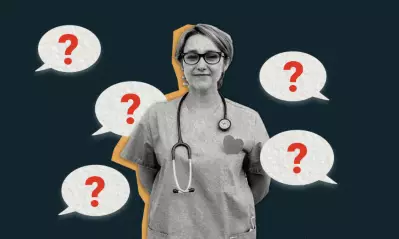Articles > Healthcare > Clinical vs. non-clinical healthcare careersÂ
Clinical vs. non-clinical healthcare careersÂ

Written by Michael Feder

Reviewed by Mark Jóhannsson, DHSc, MPH, Dean, College of Health Professions

The healthcare field is vast. Hospitals operate like small cities with dozens of departments working to make their communities healthier. The opportunities to support patients are equally diverse, from roles that embrace a specialty like nursing to those that are non-patient-facing. Here's a look at both of those types of careers.
The difference between clinical and non-clinical healthcare careers
Within the healthcare system including hospitals, clinics and physician's offices there are two types of professionals -- those in clinical and non-clinical healthcare careers. The main differences between clinical and non-clinical healthcare careers is that clinical healthcare jobs support patients directly, while their non-clinical counterparts do not.Â
Working in healthcare is as rewarding as it is robustly full of diverse opportunities. From clinical roles to administrative ones, there are pathways for a variety of interests and skills.
Clinical careers in healthcare
Anyone who is looking to work daily in hands-on jobs to support patients directly is interested in a clinical career. Clinical roles are involved in the treatment, diagnosis and follow-up of patient care. In the nursing field, this includes RNs and nurse practitioners.
Registered nurse
´ˇĚý is a healthcare professional responsible for providing direct patient care in settings like hospitals and clinics. Their duties include recording patients’ medical histories and symptoms, administering medications, monitoring vital signs, and collaborating as part of a team. RNs may also educate patients about health conditions and treatment plans.Â
To become an RN, one can pursue a . After completing education, passing the NCLEX-RN and obtaining state licensure is required. Key qualities are compassion, effective communication, emotional stability and physical stamina.
Nurse practitioner
´ˇĚýnurse practitioner (NP) is an advanced practice registered nurse with an expanded scope of responsibilities in healthcare. NPs often work independently and are authorized to diagnose and treat various medical conditions. Their role includes ordering and performing diagnostic tests, diagnosing and treating acute and chronic conditions, prescribing medications and managing a patient’s overall well-being.
To become a nurse practitioner, individuals need to complete at least a master’s degree program designed for advanced practice nursing. Such programs include clinical experience and prepare students for certification in their chosen specialty. NPs play a crucial role in providing primary and specialized care and, amid a primary care shortage in the U.S., provide needed access to healthcare services.
Non-clinical careers in healthcare
Professionals in non-clinical healthcare careers don’t typically work with patients directly or diagnosis or provide treatment. These professionals are still essential to healthcare. They often keep hospitals and clinics running so those in clinical positions can focus on patients.
Here are a few examples of non-clinical healthcare careers.
Healthcare manager
Healthcare managers are also known as health services managers. They directly manage hospitals and other healthcare facilities. They are often in charge of handling the budget, managing staffing needs and training programs, creating work schedules and organizing facility records. They are required to set and carry out policies and procedures within their workplace.
To , one typically needs a bachelor’s degree, according to the U.S. Bureau of Labor Statistics. In some cases, an employer may hire someone with an associate degree for this role.
Health information technician
Health information technicians securely collect and process patient data. This can range from tracking patient health records to securing data from a clinical trial. Professionals in this space might also work with billing services or with researchers to track trends.
To become a health information technician, one needs at least a high school diploma or GED. However, some employers hire people with an accredited associate or bachelor’s degree in a related field. Many seek certification by taking the Registered Health Information Technician .ĚýĚý
Medical coder Â
Modern hospitals run through a series of codes. Every treatment and medication is assigned a universal code so doctors can track a patient’s journey. Medical coders document the codes and ensure patients are billed accurately. These positions require immense attention to detail; otherwise, patients might get billed for treatment they didn’t have or have medications they didn’t receive.
To become a medical coder, one needs at least need a high school diploma or GED. A degree in a related field from a college or university is not necessarily required, but some employers prefer it. From there, students can complete a certificate program or pursue a four-year degree.
Programs for non-clinical healthcare careers
If you’re interested in non-clinical healthcare careers but need certificate and degree programs that offer flexible scheduling and fixed tuition, consider programs at °®¶ą´«Ă˝. Here are just a few to consider:
- Bachelor of Science in Health Administration
- Bachelor of Science in Health Management
- Master of Health Administration/Master of Business Administration
- Master of Public Health with a concentration in Community Health Leadership
Contact °®¶ą´«Ă˝ for more information.

ABOUT THE AUTHOR
A graduate of Johns Hopkins University and its Writing Seminars program and winner of the Stephen A. Dixon Literary Prize, Michael Feder brings an eye for detail and a passion for research to every article he writes. His academic and professional background includes experience in marketing, content development, script writing and SEO. Today, he works as a multimedia specialist at °®¶ą´«Ă˝ where he covers a variety of topics ranging from healthcare to IT.

ABOUT THE REVIEWER
Mark Jóhannsson is the Dean of the College of Health Professions. He has a career spanning over 35 years of healthcare management, public health practice, higher education administration, teaching and clinical/behavioral research within corporate, community and academic settings. He has served as both an educational and keynote speaker, and he has been published in a variety of peer-reviewed and periodic literature.
This article has been vetted by °®¶ą´«Ă˝'s editorial advisory committee.Â
Read more about our editorial process.




Get your free Healthcare programs guide
Explore our healthcare degrees and certificates - 100% of our programs are aligned to career-relevant skills.
You’re making moves!
This guide is loaded with answers. Download it now or get it from your inbox. Questions? We’re just a call or click away.
Get your free healthcare programs guide. Please enter your first and last name.
You’re making moves!
This guide is loaded with answers. Download it now or get it from your inbox. Questions? We’re just a call or click away.


